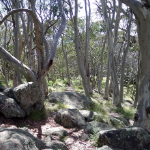 Advent Journey of Faith
Advent Journey of Faith
On the Second Sunday of Advent, the Gospel reading (Mark 1:1-8) commences the story of Jesus Christ with the preaching of John the Baptist in the desert wilderness, who came to "prepare a way of the Lord and make his paths straight". We are reminded that the Advent journey is a journey of faith not just a journey to Bethlehem.
In the tradition of the Prophets of the Old Testament, John was calling the people to return to the God of their faith to lead them to better times, toward healing and wholeness, to stand against the tide of sin and destruction.
With so much of our world’s beautiful wild areas (wilderness) under threat from de-forestation, land-clearing and climate change-induced loss of bio-diversity and vegetation (desert-ification), there are many faith-filled people in this great Advent season of hope praying and acting for justice for our environment, for conservation and restoration of God’s gift of creation to its abundant fruitfulness for all to share.
In our reading from Isaiah, we hear the Prophet comfort and console us in the journey of our faith. Whereas Peter’s letter tells us “that with the Lord, a day is like a thousand years and a thousand years like a day” (2 Peter 3:8), Isaiah’s words reminds us that God also accompanies us on our journey of faith as close as a Shepherd “gathering lambs in his arms, holding them against his breast” (Isaiah 40:11).
We need both the beauty of physical wilderness in our lives and the discomforting prophets. May we take time in this season of Advent to be renewed by the promises of our patient Lord wanting no one to be lost.
Now faith is the assurance of things hoped for, the conviction of things not seen. (Hebrews 11:1)
About Advent or the Nativity Fast in the Orthodox Church
In the Eastern and Oriental Orthodox Churches, Advent is observed for forty days beginning on 15 November. The term “Christmas” is seldom heard in Orthodox circles as the Feast of Christmas is called by various names including “The Nativity” and “The Incarnation”. It is celebrated on or near January 7 in the Gregorian calendar. This date works out to be December 25 in the Julian calendar, which pre-dates the Gregorian calendar that is in current global use. The Feast of the Nativity is celebrated for twelve days culminating in the Feast of Epiphany, or Theophany, as it is sometimes called.
AT YOUR COMING
by Bruce D Prewer
Where two or three gather
together in your name,
yet become self-satisfied,
exclusive, and self-serving:
At dusk or at daybreak,
midnight or midday,
wake us at your coming.
Behind the soul’s locked doors,
listening to our own wants,
protecting our privileges,
suspicious of your knock:
At dusk or at daybreak,
midnight or midday,
wake us at your coming.
In the breaking of bread,
repeated so frequently,
that familiarity has bred
nonchalance and loss of wonder:
At dusk or at daybreak,
midnight or midday,
wake us at your coming.
Among the hungry and thirsty,
homeless and deserted,
street kids and refugees
and the poor always with us:
At dusk or at daybreak,
midnight or midday,
wake us at your coming.
On the road to the world’s end,
witnessing to your name,
sure of our mission,
too sure of our dogmas:
At dusk or at daybreak,
midnight or midday,
wake us at your coming.
On the day of consummation,
when all heaven and earth
will be brought into unity
and God will be all in all:
At dusk or at daybreak,
midnight or midday,
wake us at your coming.
(Bruce D Prewer ‘More Australian Psalms’ Openbook Publishers 1996)












